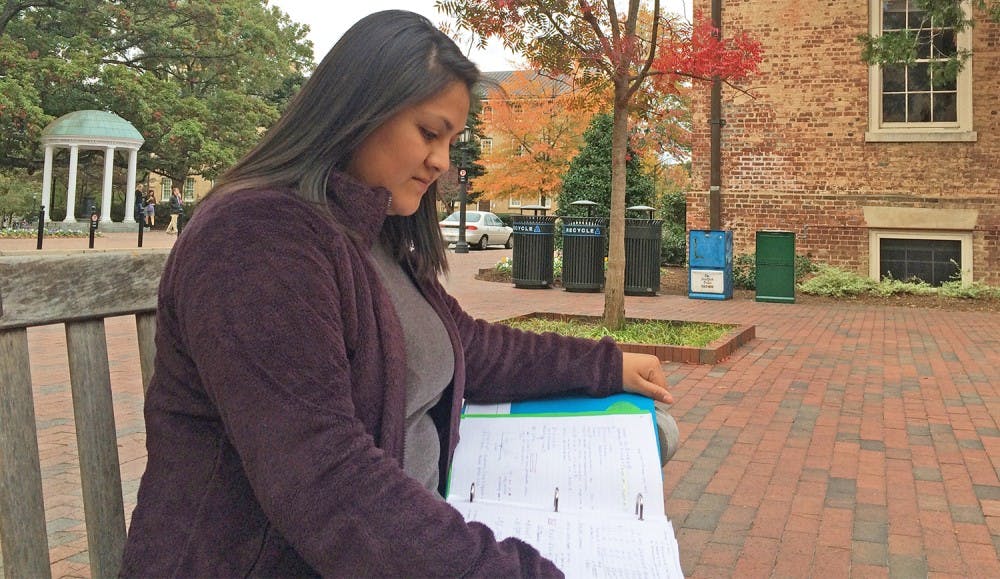“We have previously done students from North Carolina and South Carolina, and we’re expanding a bit for students from all states where they don’t have tuition equity,” Grantham said.
The Golden Door scholarship only accepts students who are included in the Deferred Action for Childhood Arrivals act passed by President Barack Obama in 2012 or who have been otherwise temporarily protected from deportation.
Grantham said the scholarship only accepts these students because they then set them up with employers who hire DACA individuals.
“We actually have six students about to graduate this year, and one of the challenges this year is that some companies are very DACA-friendly and some don’t understand that they can employ these students,” Grantham said.
When DACA was passed, Islas said she was told she would receive financial aid, so she signed a lease for an apartment in Chapel Hill and planned on attending UNC the following fall. Only weeks before her planned move-in, she was told her financial aid fell through.
Islas was living in Chapel Hill unable to attend classes when a professor from her community college told her about the Golden Door scholarship, which she successfully applied for.
Islas, who moved from Mexico City to Pikeville, N.C., when she was 6 years old, did not share her immigration status with people in her hometown. Once she came to UNC, she said she felt more comfortable sharing her status.
“I was just concerned about being treated differently,” she said. “Even now, I’m a senior, and I’m applying for jobs. I hate bringing that up because I want them to see me for who I am, not my documentation status.”
Sophomore Mayela Peralta is also a Golden Door Scholar. She said she realized the limitations placed on her due to her documentation status when her older sister was accepted to UNC but was unable to pay for it because she lacked access to federal financial aid.
She said some of the most hurtful stigmas placed on undocumented citizens are the most common ones.
“I’ve been told that undocumented citizens don’t pay taxes, and they’re like, ‘You don’t deserve in-state tuition.’ If you knew that everyone had to pay taxes regardless (of documentation status), you’d understand that in-state tuition would be logical,” she said.
To become a Golden Door Scholar, Peralta said she filled out an online application, completed a phone interview and then had eight to 10 round-robin interviews in person — each of which lasted 15 to 20 minutes.
To get the day's news and headlines in your inbox each morning, sign up for our email newsletters.
The Morehead-Cain scholarship is not available to students who aren’t documented, said Charles Lovelace, executive director of the Morehead-Cain Foundation.
Even though Lovelace said the scholarship’s funding is not federal, he said federal and state policies barring undocumented students from receiving federal money are the reason why his foundation chooses to do the same.
“We are federally tax-exempt, so we feel like we have to comply with these issues,” Lovelace said. “If the University policy or state and federal policies changed, we would look at that. Absolutely, it’s a real problem.”
The Robertson Scholars Leadership Program, another full scholarship that partners programs at Duke University with UNC, does accept undocumented students, executive director Allen Chan said.
UNC graduate Emilio Vicente, who has lived in North Carolina for 15 years, was considered an international student when applying to UNC. He now works at the Southeast Immigrant Rights Network and said a lot of ignorance still surrounds the topic of documentation status.
“A big thing I always get asked is, ‘Why don’t you apply for papers? Why don’t you go to the end of the line?’” Vicente said. “The answers to those questions are very complicated.”
Sophomore Kristen Gardner, a member of Students United for Immigrant Equality, said it is important to recognize undocumented students face greater challenges in accessing higher education than U.S. citizens do.
“Not just the financial barriers, but the social stigma and emotional and physical stress that comes from feeling the need to hide your identity and feeling like you don’t belong in the community that you grew up in your whole life,” Gardner said. “I think it’s administration’s role to make (UNC) feel like a welcoming environment and be able to recognize the unique needs of these students and actively work to see that these students are thriving.”
Islas said undocumented people feel just as American as their documented counterparts and aren’t necessarily criminals.
“I always consistently get slapped in the face with, ‘Wait, you’re undocumented, so you can’t do this, you can’t do that,’ which feels horrible, because I grew up with a whole lot of other citizens that made me feel like one,” Islas said.
university@dailytarheel.com



